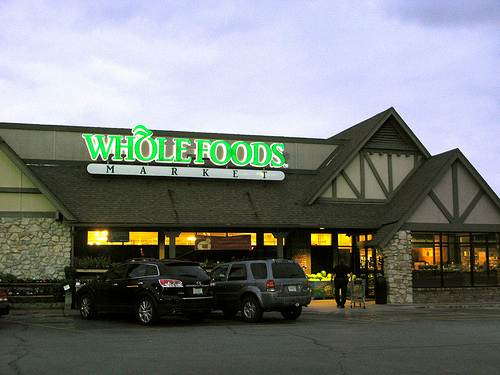This past week I was lucky enough to get the chance to try out Spud’s organic delivery service. But in order to properly review the site and the service, I felt the need to compare it with another organic grocery chain, in order to provide a more valuable sense of perspective. So I decided to swing by my local Whole Foods Market to get a little scope.
The first thing I noticed, as I pulled into the parking stall, was the shiny new jaguar I was parked across from. Compared with my well loved, if slightly beat up, old Saturn, I felt a little out of place. Whole Foods has developed a bit of a reputation, particularly among the younger demographics of grocery shoppers, as a yuppie environmentalist market.
I must admit that I feel there is a grain of truth to this judgment. The selection is vast, the quality is impeccable, everything is natural and organic, and as such the prices are, understandably, high. Whole Foods has very much earned its nickname of “Whole Paycheck”. It made sense that at least one shopper had a nice car. If I made enough money to buy all my food at Whole Foods, I would probably drive something much nicer as well.
[ad name=”Go-RT-Large Square”]But as I said, Whole Foods has a reputation, and for a reason. While they address the issue of organic and natural food products, and even sustainable agriculture, they fail to see the irony of encouraging excessive consumption through it.
Take for example, an entire aisle of bottled water of all shapes and sizes, offset by a small display of reusable bottles. Whole Foods seems to be sending out very conflicting messages on what sustainability really means. But in fairness, you have to recognize that they aren’t there to teach or encourage green living. They are a business. They are there to fill a particular demand; a demand for fresh, high quality organic and natural foods. Whole Foods is capitalism’s response to environmentalism. I’m not really sure what to think about that really.
It speaks to the part of us that wants to be green but at the same time wants what we want. No wonder they’ve been so successful. Consumers can relieve their fair trade or organic guilt while still indulging.
I don’t mean to be overly cynical or harsh, because a part of me feels that in a case like this the end result, people eating more organic products, might well justify the consumption driven means. Also, I’m just going to say it, my God, the food there is outright amazing. I wish I could by all my groceries there.
But we as consumers, and as environmentally conscientious members of society, need to recognize that there is more to sustainable living that buying the right products from the right businesses. Even if we can afford it.
Ironically enough, on my way home from Whole Foods, trunk laden with enough groceries to make me feel guilty for spending so much money, I was passed by the little purple Spud! organic delivery truck on it’s rounds. But more on that in my Spud review article, here.

Comments 8
It’s odd you would be surprised that Whole Foods isn’t actually concerned with saving the environment. They are a corporation which is legally bound to the shareholders to make as much profit as possible. They only have organic and healthy food because there is a large market for it. If they started pushing reusable water bottles (low markup) over disposable ones (huge markup) they would most likely be voted out by the shareholders and replaced with someone more concerned with profits. Unfortunate, but this kind of business structure has only one outcome.
Author
This is a really good point, and part of the one I was trying to make. Conscientious consumers need to recognize that Whole Foods is a profit motivated business, as are most all businesses even the “green” ones, and that despite their dedication to organic products and reusable grocery bags, they are not addressing the essential environmental issue of over-consumption. That is something only we as consumers have the power to do.
Pingback: Natural Groceries Part 2: Spud! Organic Delivery Service | The Chic Ecologist
Pingback: Food as an Environmental Issue | The Chic Ecologist
Pingback: Food as an Environmental Issue
Pingback: Take a Peek at Emeril Green | The Chic Ecologist
Pingback: Rethinking Green Attitude | The Chic Ecologist
Pingback: Good Greens Raw Organic Food Bar | The Chic Ecologist